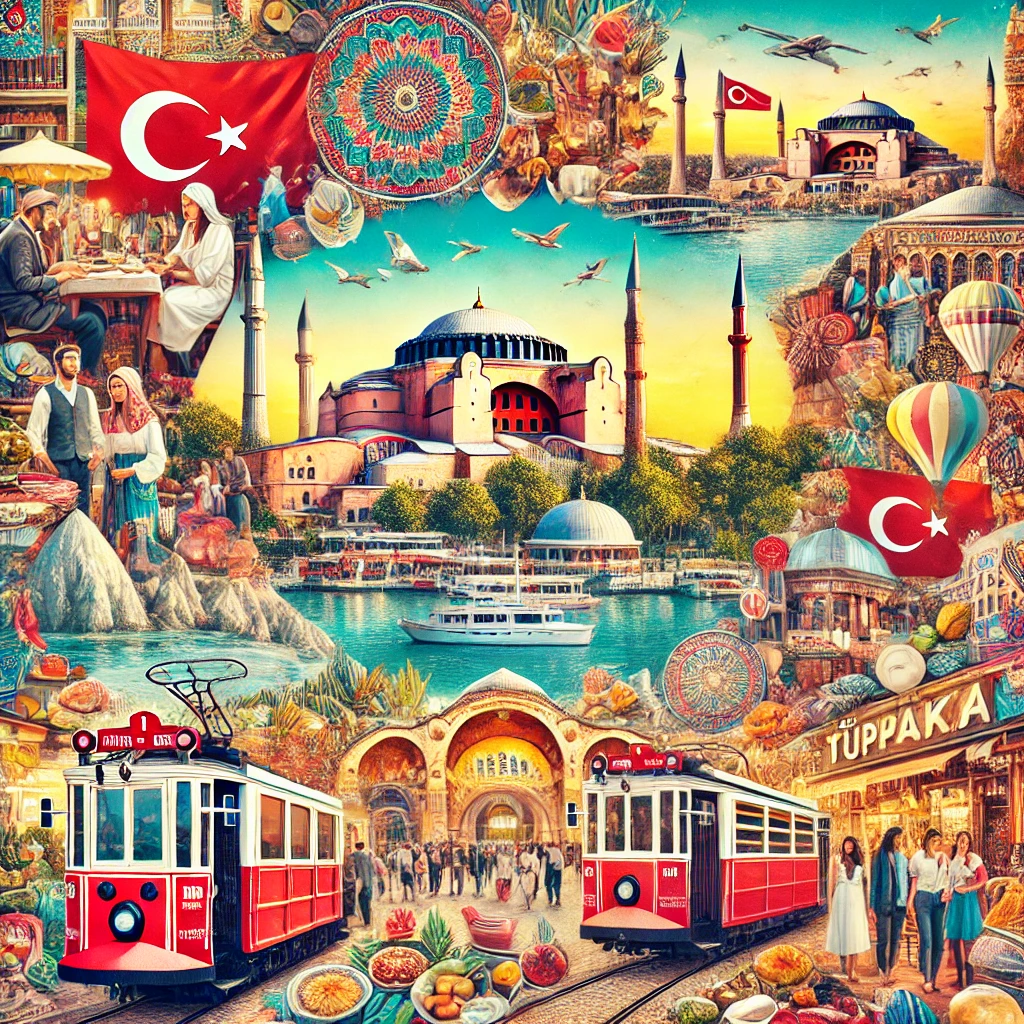Turkey: Respect, Contact
Visiting Turkey is an enriching experience filled with history, culture, and hospitality. To make the most of your trip, it’s important to understand and respect local customs and know how to stay in touch with locals and services. This guide covers essential aspects of respect and contact in Turkey, ensuring a smooth and respectful journey.
Respect Local Customs and Traditions in Turkey
When traveling in Turkey, being aware of and respecting local customs and traditions is crucial. Here are some key points to keep in mind:
1. Greetings and Social Etiquette
In Turkey, greetings are important. A firm handshake is common among men, while a slight nod or bow can be used for women. When meeting someone for the first time, using titles such as “Bey” (Mr.) or “Hanım” (Mrs./Ms.) followed by the person’s first name is respectful.
2. Dress Code
While Turkey is relatively liberal, dressing modestly is appreciated, especially in rural areas and religious sites. When visiting mosques, women should cover their heads, and both men and women should wear clothes that cover their arms and legs.
3. Hospitality and Gift-Giving
Turkish hospitality is legendary. If invited to a Turkish home, it’s customary to bring a small gift, such as sweets or flowers. Complimenting the host’s home and expressing gratitude for their hospitality is always appreciated.
4. Table Manners
Table manners in Turkey are essential. Wait for the host to start eating before you begin. It’s polite to try a bit of everything offered to you. Complimenting the food and the chef is also a good practice.
Understanding Social Norms in Turkey
Respecting social norms in Turkey will help you blend in and avoid any unintentional offenses.
1. Public Displays of Affection
Public displays of affection are frowned upon in Turkey, especially in rural areas. Holding hands is generally acceptable, but anything more intimate should be reserved for private settings.
2. Smoking and Drinking
While smoking is common in Turkey, it is prohibited in indoor public places. Drinking alcohol is acceptable in many places, but public drunkenness is not tolerated. Always be mindful of your surroundings and the local customs regarding alcohol consumption.
3. Religion and Religious Practices
Turkey is predominantly Muslim, and respecting religious practices is important. During the call to prayer, it’s courteous to lower your voice and remain respectful. When visiting mosques, follow the dress code and behave respectfully.
Contact and Communication in Turkey
Staying connected in Turkey is easy, but knowing the best ways to do so can enhance your experience.
1. Mobile Phones and SIM Cards
Upon arrival, consider purchasing a Turkish SIM card for your mobile phone. Major providers like Turkcell, Vodafone, and Türk Telekom offer a range of prepaid plans with data, making it easy to stay connected. These SIM cards are available at airports, mobile shops, and convenience stores.
2. Internet Access
Internet access is widespread in Turkey, with free Wi-Fi available in many hotels, cafes, and restaurants. If you need reliable internet on the go, consider getting a portable Wi-Fi device or a local SIM card with a data plan.
3. Emergency Contacts
Knowing the local emergency numbers is essential. In Turkey, dial 112 for medical emergencies, 155 for the police, and 110 for the fire department. Most operators speak English, but it’s helpful to know some basic Turkish phrases.
Navigating Turkish Hospitality and Cultural Expectations
Understanding the nuances of Turkish hospitality and cultural expectations will make your interactions smoother and more enjoyable.
1. Accepting Invitations
Turkish people are known for their hospitality. If you’re invited to someone’s home, try to accept if possible. It’s a sign of respect and appreciation. Always arrive on time or slightly early, as punctuality is valued.
2. Gift-Giving Etiquette
When bringing a gift to a Turkish home, sweets or chocolates are always a good choice. Avoid alcohol unless you know the host drinks. If offered a gift, accept it graciously and express your gratitude.
3. Conversational Topics
When conversing with locals, it’s best to avoid sensitive topics such as politics and religion. Instead, focus on positive subjects like Turkish cuisine, culture, and history. Showing interest in their traditions and way of life is always appreciated.
Engaging with Local Services and Businesses in Turkey
Knowing how to interact with local services and businesses will enhance your experience in Turkey.
1. Using Public Transportation
Public transportation in Turkey is efficient and affordable. When using buses, trams, or the metro, always give up your seat for elderly passengers, pregnant women, and those with disabilities. Have your fare ready to avoid delays.
2. Tipping Practices
Tipping is customary in Turkey but not mandatory. In restaurants, a tip of 5-10% is appreciated. For taxi drivers, rounding up the fare is sufficient. Hotel staff and tour guides also appreciate small tips for good service.
3. Shopping Etiquette
When shopping in markets or bazaars, bargaining is expected. Approach it with a friendly attitude and enjoy the interaction. In fixed-price stores, it’s best to respect the posted prices.
Staying Safe and Healthy in Turkey
Ensuring your safety and health during your visit is paramount.
1. Health Precautions
While the tap water in Turkey is generally safe for brushing teeth and washing, it’s best to drink bottled water. Carry hand sanitizer and use it regularly, especially before meals.
2. Personal Safety
Turkey is a relatively safe country, but like any destination, it’s important to stay vigilant. Keep your belongings secure, avoid displaying valuable items, and be cautious in crowded areas.
3. Travel Insurance
Having travel insurance is highly recommended. It can cover unexpected medical expenses, trip cancellations, and lost belongings. Make sure your policy includes coverage for all activities you plan to do.
Enhancing Your Cultural Experience in Turkey
To fully immerse yourself in Turkish culture, consider the following activities:
1. Learning Basic Turkish Phrases
Learning a few basic Turkish phrases can go a long way. Locals appreciate the effort and it can enhance your interactions. Common phrases include “Merhaba” (Hello), “Teşekkür ederim” (Thank you), and “Lütfen” (Please).
2. Participating in Local Festivals
Turkey hosts numerous festivals throughout the year. Participating in events like the Whirling Dervishes Festival in Konya or the International Istanbul Film Festival can provide unique cultural insights.
3. Exploring Turkish Cuisine
Turkish cuisine is diverse and delicious. Don’t miss trying local specialties like kebabs, baklava, and Turkish tea. Visiting local markets and food stalls can offer a genuine taste of Turkish culture.
Respecting Nature and the Environment in Turkey
Respect for the environment is an integral part of Turkish culture.
1. Responsible Tourism
When visiting natural sites, always follow the principles of responsible tourism. Stay on designated paths, avoid littering, and respect local wildlife.
2. Eco-Friendly Practices
Many Turkish hotels and businesses are adopting eco-friendly practices. Support these initiatives by choosing environmentally responsible accommodations and services.
3. Water Conservation
Turkey experiences periodic droughts, so water conservation is important. Take shorter showers, turn off taps when not in use, and reuse towels in hotels.
Final Thoughts
Turkey is a country rich in history, culture, and natural beauty. By respecting local customs, staying connected, and engaging positively with locals, you can ensure a memorable and enriching experience. Enjoy the hospitality, explore the diverse landscapes, and immerse yourself in the vibrant culture that Turkey has to offer.
Latest Update: Jul 15, 2024
Your Content Goes Here
A brief summary of the key points in this article.




